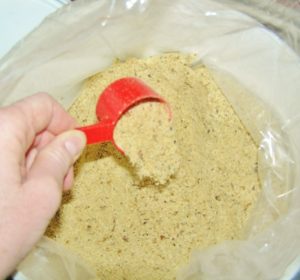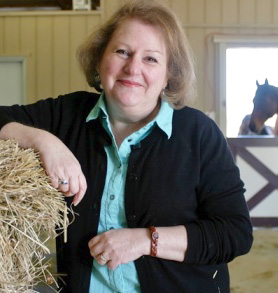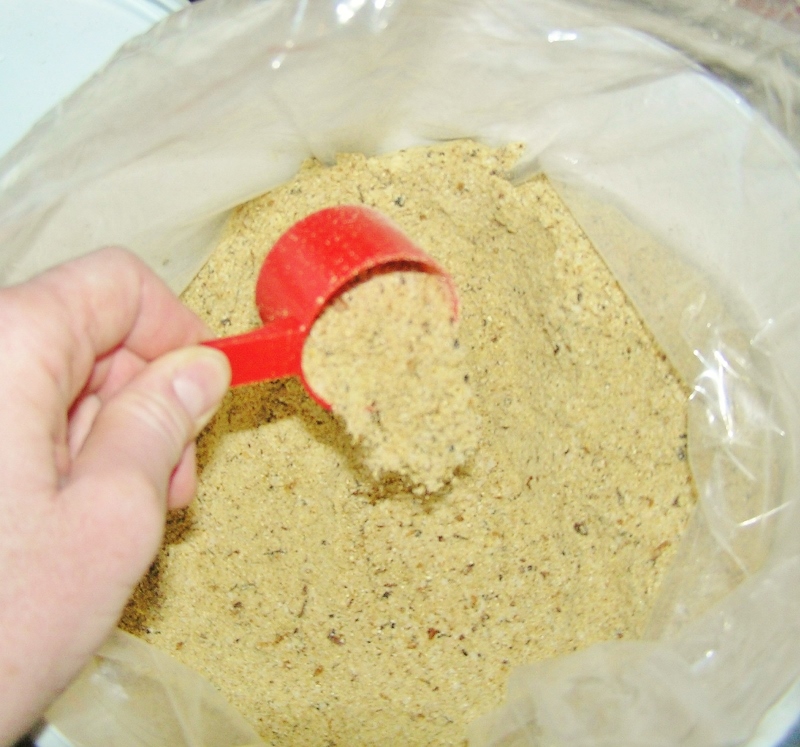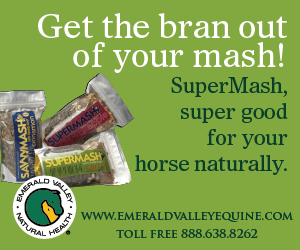by Dr. Juliet M. Getty, Ph.D.
 With travel and competition season just around the corner, “show nerves” are common. Agitated, nervous horses that are normally well behaved may benefit from nutritional calming. But before deciding, make sure your horse isn’t stressed by things that you can control. Restricting forage where the stomach becomes empty is the main cause of behavioral issues. Forage (hay and/or pasture) should be available 24/7, all day and all night, if you intend to feed in sync with the way horses are meant to eat.[i] This will help your horse maintain a healthy weight,[ii] reduce inflammation, and prevent ulcerations.[iii] Therefore, it would be unwise to rely on a calming supplement, when with a little effort, you can identify the underlying causes of your horse’s excitable behavior.
With travel and competition season just around the corner, “show nerves” are common. Agitated, nervous horses that are normally well behaved may benefit from nutritional calming. But before deciding, make sure your horse isn’t stressed by things that you can control. Restricting forage where the stomach becomes empty is the main cause of behavioral issues. Forage (hay and/or pasture) should be available 24/7, all day and all night, if you intend to feed in sync with the way horses are meant to eat.[i] This will help your horse maintain a healthy weight,[ii] reduce inflammation, and prevent ulcerations.[iii] Therefore, it would be unwise to rely on a calming supplement, when with a little effort, you can identify the underlying causes of your horse’s excitable behavior.
The number of calming supplements on the market is daunting
Each contains specific nutraceuticals designed to calm your horse, but it is difficult to know which one to choose. There are four specific ingredients that I find effective. You can use them individually, or in combination with each other. But my goal is to ease the confusion and help you make the best choice for your horse’s individual needs.
Start with magnesium
A borderline magnesium deficiency may be the issue, since most horses don’t get enough of this mineral. Poor absorption rates from forages has a lot to do competition from calcium. Therefore, magnesium from natural sources is not as well absorbed as the popular inorganic magnesium oxide.[iv] Organic versions, such as magnesium citrate, malate, and proteinate, are also well absorbed, comparably to inorganic sources.[v]
Magnesium is involved in relaxation of the muscles and nervous system and has been studied extensively using laboratory animals and horses.[vi] Not enough magnesium can induce anxiety.[vii] Typically, such horses will appear “sensitive” where they may spook easily, avert their attention away from you, become irritable, or are uncomfortable and nervous.
When supplementing magnesium, it is best to bring it in line with the calcium content of the diet. A 2:1 ratio of Ca: Mg is appropriate and can be as high as 1:1, but magnesium should never exceed calcium. Typically, supplementing 5,000 mg of magnesium per 500 lbs of body weight will make a positive change in your horse’s demeanor. And the nice thing about adding magnesium to the diet is that you will see results within a few days. If you do not, then you know that a magnesium deficiency is not the issue.
B vitamins
There are eight B vitamins that work in concert with one another to assist with a variety of functions including the health of the nervous system. The hindgut microbial population is responsible for producing enough B vitamins to meet your horse’s needs. But when their numbers are compromised by stress, high starch diets, illness, or antibiotics, B vitamin production may decrease.[viii] To assist with more B vitamin production, adding a potent probiotic can replace what is lost, especially from antibiotics, while adding a prebiotic will feed existing microbes.
Thiamin, vitamin B1, is particularly interesting. Supplemented at high doses (1 mg per pound of body weight) will help your horse keep up with the demands of working and performing.[ix] Racehorses, for example, can become lethargic, depressed, and develop a dull attitude. Since thiamin is part of an enzyme needed for energy metabolism, horses with unusually high energy requirements seem to bounce back with spirit and vigor when this B vitamin is added to the diet.
Ashwagandha
Ashwagandha (Withania somnifera) is a valued herb of the Indian Ayurvedic system of medicine. This is an adaptogenic herb, meaning that it adapts to the horse’s experience and balances the mood. It serves as an anti-depressant and has been used extensively in humans and animals. While we typically do not talk about depression in horses, it can occur more often than we realize.[x]
Ashwaganda is truly extraordinary.[xi] It can alleviate the impact of a stressful lifestyle including habits such as cribbing and weaving. It may even reduce effect of tension that horses experience from intense activity by increasing physical endurance and stamina, while at the same time, reducing the cortisol response.[xii]
Interestingly, this herb also reduces pain.[xiii] Pain can be a significant stressor for horses recovering from athletic injuries or suffering progressively worsening aging-related arthritis. By offering Ashwagandha, you may be able to ease your horse’s distress as well as improve recovery time from injury or surgery. An appropriate dose would be 1000 to 1500 mg for a full-sized horse.
L-Theanine
Not to be confused with the essential amino acid, L-threonine, L-theanine is an amino acid derivative, not commonly found in the diet but is contained in green tea. It increases the level of serotonin and dopamine to promote calm and relaxation, without sedation. It is highly effective against anxiety. While horses don’t typically drink tea, it may be helpful to find a supplement[xiv] that contains adding L-theanine to quiet any nervous behavior.
Chemically, L-theanine blocks the binding of L-glutamic acid to the glutamate receptors within the brain, creating a relaxed state. Researchers in Japan performed multiple studies with humans[xv] and with mice[xvi] and found remarkable benefits of L-theanine supplementation in reducing stress responses. While no studies, to date, have been done with horses, this amino acid is starting to show up in equine supplements and the anecdotal evidence suggests that it is helpful in helping horses cope with anxiety-producing situations.
Two studies in particular[xvii], revealed that L-theanine increases the release of dopamine in the brain. However, there are questions left unanswered regarding these findings and thus far, L-theanine cannot be called a dopaminergic substance with any certainty. However, it could be an interesting factor in the future management of cushingoid horses.
Most products are a combination of ingredients
L-tryptophan is a popular ingredient. It is an essential amino acid that leads to serotonin synthesis in the brain and can be useful in soothing a nervous horse. For this effect to occur, it is best to offer tryptophan as a paste between meals. If added directly to a meal, other amino acids from the meal’s protein content will compete with tryptophan to cross the blood-brain barrier. Consequently, most of the tryptophan may not be used for serotonin production and the calming effect will be significantly diminished.
Although it does appear to reduce cortisol levels in stressful situations, the research is inconclusive.[xviii] However, full-sized horses seem to be made relaxed and even sleepy when given 500 mg or more of tryptophan.
A variety of herbs are commonly added to calming preparations. These can include Rhodiola rosea, Magnolia officinalis, Chamomile, raspberry leaf, valerian, and passion flower, among others. Most calming supplements, however, include magnesium and perhaps some vitamin B1, since these are tried and true ingredients.
Bottom line
Behavioral issues that involve a nutritional component can generally be resolved by providing adequate magnesium. A horse’s history, as well as his current environment, can significantly influence behavior, so care in tending to remove stressors from your horse’s life may be the best calming agent of all. If a calming supplement is needed for particularly difficult circumstances, it may be “trial and error” before you find what works well. Fortunately, there are excellent approaches to consider.
[i] Getty, J.M, 2017. Respect the power of the horse’s instincts. http://gettyequinenutrition.biz/library/respectthepowerofthehorsesinstincts.htm
[ii] Getty, J.M., 2017. Forage deprivation keeps your horse fat. http://gettyequinenutrition.biz/Library/Foragedeprivationkeepsyourhorsefat.htm
[iii] Getty, J.M., 2015. Don’t let your horse develop an ulcer. http://gettyequinenutrition.biz/library/dontletyourhorsedevelopanulcer.htm
[iv] Harrington, D.D., and J.J. Walsh. 1980. Equine magnesium supplements: evaluation of magnesium sulphate and magnesium carbonate in foals fed purified diets. Equine Veterinary Journal, 12, 32-33.
[v] Richards, N., 2011. Which form of magnesium is best? Feed XL Newsletter #36. http://www.ahuroa-feed.co.nz/uploads/8/8/3/4/8834018/__newsletter_36_-_which_form_of_magnesium_is_best.pdf
[vi] Dodd, J.A., Doran, G., Harris, P., and Noble, G.K., 2015. Magnesium aspartate supplementation and reaction speed response in horses. Journal of Equine Veterinary Science, 35, 401.
[vii] Sartori, S.B., Whittle, N., Hetzenauer, A., and Singewald, N., 2012. Magnesium deficiency induces anxiety and HPA axis dysregulation: Modulation by therapeutic drug treatment. Neuropharmacology, 62(1), 304-312.
[viii] Barnhart, K., Reddish, J.M., and Cole, K., Influence of probiotic supplementation on microbial diversity in the gastrointestinal tract of Miniature horses. Journal of Equine Veterinary Science 35, 413/
[ix] Topliff, D. R., Potter, G. D., Dutson, T.R., Kreider, J.L., and Jessup, G.T., 1983. Diet manipulation and muscle glycogen in the equine. Proceedings of the 8th Equine Nutrition Physiology Symposium, 119. And, Wolter, R., 1987. La nutrition de l’animal de sport. Science Sports, (2)2, 63.-73.
[x] McCluskey, M., 2016. Spotting signs of equine depression. Equus Magazine. https://equusmagazine.com/behavior/spotting-signs-equine-depression-52913
[xi] CurOst EQ Adapt & Calm by Nouvelle Research is available at http://horsesupplements.gettyequinenutrition.biz
[xii] Singh, N., Bhalla, M., de Jager, P., and Gilca, M., 2011. An overview on Ashwagandha: A rasayana (rejuvenator) of Ayurveda. African Journal of Traditional, Complementary and Alternative Medicines, 8(5 Suppl), 208-213.
[xiii] Twaij, H.A.A., Elisha, E.E., and Khalid, R.M., 1989. Analgesic studies on some Iraqi medicinal plants. International Journal of Crude Research, 27, 109-112.
[xiv] ForeCalm by Forefront Equine is available at http://horsesupplements.gettyequinenutrition.biz
[xv] Kimura, K., Ozeki, M., Juneja, L.R., and Ohira, H., 2007. L-Theanine reduces psychological and physiological stress responses. Biological Psychology, 74, 39-45.
[xvi] Wakabayashi, C., Numakawa, T., Ninomiya, M., Chiba, S. and Kunugi, H., 2012. Behavioral and molecular evidence for psychotropic effects in L-theanine. Psychopharmacology, 219, 1099-1109.
[xvii] Yokogoshi, H., and Terashima, T., 2000. Effect of theanine, r-glutamylethylamide, on brain monoamines, striatal dopamine release and some kinds of behavior in rats. Nutrition, 16(9), editorial pages. And, Li, C., Tong, H., Yan, Q, et. al., 2016. L-theanine improves immunity by altering TH2/TH1 cytokine balance, brain neurotransmitters, and expression of phospholipase C in rat hearts. Medical Science Monitor: International Medical Journal of Experimental and Clinical Research, 22, http://www.medscimonit.com/abstract/index/idArt/897077
[xviii] Davis, B.P., Engle, T.E., Ransom, J.I., and Grandin, T., 2017. Preliminary evaluation on the effectiveness of varying doses of supplemental tryptophan as a calmative in horses. Applied Animal Behaviour Science, 188, 34.41.
______________________________________________________
Permission to reprint this article is granted, provided attribution is given to Juliet M. Getty, Ph.D. No editorial changes may be made without her permission. Dr. Getty appreciates being notified of any publication.
 Juliet M. Getty, Ph.D. is an independent equine nutritionist with a wide U.S. and international following. Her research-based approach optimizes equine health by aligning physiology and instincts with correct feeding and nutrition practices. Dr. Getty’s goal is to empower the horseperson with the confidence and knowledge to provide the best nutrition for his or her horse’s needs.
Juliet M. Getty, Ph.D. is an independent equine nutritionist with a wide U.S. and international following. Her research-based approach optimizes equine health by aligning physiology and instincts with correct feeding and nutrition practices. Dr. Getty’s goal is to empower the horseperson with the confidence and knowledge to provide the best nutrition for his or her horse’s needs.
Dr. Getty’s fundamental resource book, Feed Your Horse Like a Horse, is available in paperback as well as in hardcover, searchable CD and Kindle versions. All except the Kindle version are available at www.GettyEquineNutrition.com — buy the book there and have it inscribed by the author. Print and Kindle versions are also available at Amazon (www.Amazon.com); find print versions at other online retail bookstores. The seven individual volumes in Dr. Getty’s topic-centered “Spotlight on Equine Nutrition” series are available with special package pricing at her website, and also at Amazon in print and Kindle versions. Dr. Getty’s books make ideal gifts for equestrians!
Find a world of useful information for the horseperson at www.GettyEquineNutrition.com: Sign up for Dr. Getty’s informative, free e-newsletter, Forage for Thought; browse her library of reference articles; search her nutrition forum archives; and purchase recordings of her educational teleseminars and interviews. Find top-quality supplements, feeders, and other equine-related items, at her online Free Shipping Supplement Store[i]. Reach Dr. Getty directly at [email protected].
[i] http://horsesupplements.gettyequinenutrition.biz

Juliet M. Getty, Ph.D. is an independent equine nutritionist with a wide U.S. and international following. Her research-based approach optimizes equine health by aligning physiology and instincts with correct feeding and nutrition practices. Dr. Getty’s goal is to empower the horseperson with the confidence and knowledge to provide the best nutrition for his or her horse’s needs. Learn more at www.gettyequinenutrition.com.






